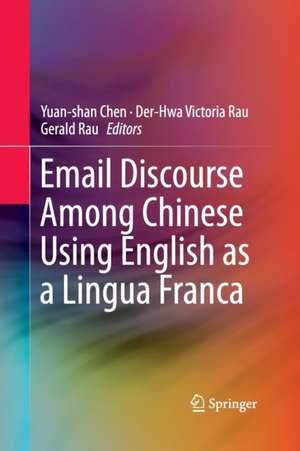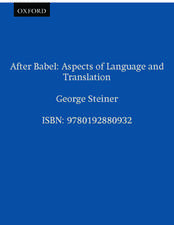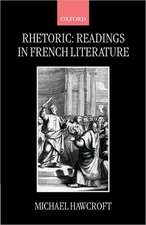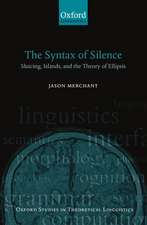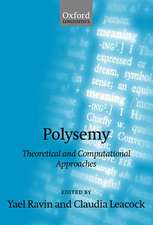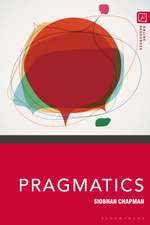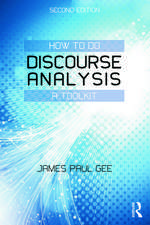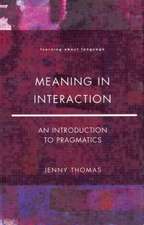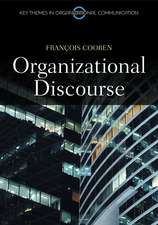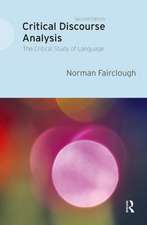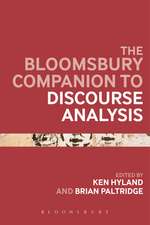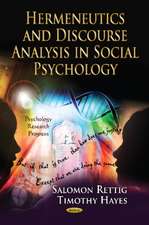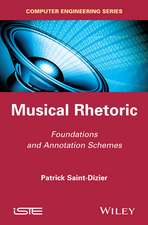Email Discourse Among Chinese Using English as a Lingua Franca
Editat de Yuan-shan Chen, Der-Hwa Victoria Rau, Gerald Rauen Limba Engleză Paperback – 4 noi 2015
This edited volume makes a valuable contribution to the burgeoning research field of English as a lingua franca. In a pioneering step, the collection is exclusively devoted to the English email discourse of Chinese speakers. The studies address innovative topics related to various contexts and relationships, using several different approaches and theories, which taken together shed light on how English serves as a lingua franca in multiple types of global written communication. The research topics presented are organized into four thematic sections, including emails from students to professors, emails from students to the international academic community, emails from peer to peer, and emails at the workplace.
This collection of empirical research invites readers to consider the special features of apologies, requests, terms of address, politeness, and discourse organization, and how cultural differences may affect the use or interpretation of each. Throughout the book, readers will also discover how Chinese speakers use special features and strategies to construct their identity, establish relationships, and achieve successful communication in English. This highly informative, thought-provoking book also provides insights on methods for teaching email discourse using English as a lingua franca and suggests directions for future research.
| Toate formatele și edițiile | Preț | Express |
|---|---|---|
| Paperback (1) | 641.03 lei 6-8 săpt. | |
| Springer Nature Singapore – 4 noi 2015 | 641.03 lei 6-8 săpt. | |
| Hardback (1) | 647.27 lei 6-8 săpt. | |
| Springer Nature Singapore – 4 noi 2015 | 647.27 lei 6-8 săpt. |
Preț: 641.03 lei
Preț vechi: 754.15 lei
-15% Nou
Puncte Express: 962
Preț estimativ în valută:
122.71€ • 126.49$ • 103.47£
122.71€ • 126.49$ • 103.47£
Carte tipărită la comandă
Livrare economică 28 februarie-14 martie
Preluare comenzi: 021 569.72.76
Specificații
ISBN-13: 9789811006760
ISBN-10: 9811006768
Pagini: 296
Ilustrații: X, 296 p.
Dimensiuni: 155 x 235 x 18 mm
Greutate: 0.44 kg
Ediția:1st ed. 2016
Editura: Springer Nature Singapore
Colecția Springer
Locul publicării:Singapore, Singapore
ISBN-10: 9811006768
Pagini: 296
Ilustrații: X, 296 p.
Dimensiuni: 155 x 235 x 18 mm
Greutate: 0.44 kg
Ediția:1st ed. 2016
Editura: Springer Nature Singapore
Colecția Springer
Locul publicării:Singapore, Singapore
Cuprins
Negotiating Personal Relationship through Email Terms of Address.- Discourse Organization and Features of Email Writing among EFL Students in Taiwan.- Do Chinese Students Waffle in Their Apologies?: An Exploration into EFL Learners’ Emails.- Politeness and Effectiveness of English Email Requests: Taiwanese Professors’ Perspectives.- Emailing Requests to International Researchers: The Construction of Identity by Chinese EFL Graduate Students.- Intercultural Taoci Email: New Wine in an Old Bottle.- Strategies Used in Chinese University Students’ ELF Emails to Remedy or Prevent Problems in Understanding.- Openings and Closings in Intercultural Email Communication: A Case Study of Taiwanese, Japanese, and Italian Students.- Apologies in Emails: Interactions between Chinese EFL Learners and Their Foreign Peers.- Status-Congruence in Request E-mail Discourse of Professional Secretaries in a University of Taiwan.- A Study on SymbolicCompetence and Face in ELF Email Communication.- Top Secret: Hacking and Fraud Detection in Business Emails of a Taiwanese Company.
Recenzii
“The ample range of reflective and empirical chapters in this collection makes this book a well-grounded and enlightening guide for the study of English as lingua franca (ELF) across cultures. … this book is to be recommended as a handbook on ELF for students, teachers, and researchers in sociolinguistics, pragmatics, and applied linguistics, and will serve as a valuable guide and stimulus for empirical replication studies.” (Yansheng Mao, System, 2016)
Notă biografică
Yuan-shan Chen has been involved in language teaching for many years. Her research interests primarily lie in the areas of interlanguage pragmatics and L2 writing research. She teaches as an associate professor at the Department of Applied English, National Chin-Yi University of Technology in Taiwan. Her recent publications include articles in Journal of Pragmatics, Language Teaching Research, System, and Language and Linguistics. Email: yuanshan@ncut.edu.tw
Der-Hwa Victoria Rau is professor of linguistics at National Chung Cheng University in Taiwan. Her research interests include sociolinguistics, applied linguistics and Austronesian linguistics. In addition to her major works on Yami (Austronesian language) grammar, dictionary and textbooks, she has also produced a textbook on Research methodology in teaching Chinese as a second language. Email: lngrau@ccu.edu.tw
Gerald Rau teaches English Scientific and Engineering Writing at National Chung Cheng University Qing Jiang Learning Center in Taiwan. A semi-retired science teacher, he
has taught ESL students for many years, has edited numerous papers in the natural sciences, medicine, applied mathematics, engineering, and linguistics and is the author of Mapping the Origins Debate. Email: gerryrau@hotmail.comTextul de pe ultima copertă
This edited volume makes a valuable contribution to the burgeoning research field of English as a lingua franca. In a pioneering step, the collection is exclusively devoted to the English email discourse of Chinese speakers. The studies address innovative topics related to various contexts and relationships, using several different approaches and theories, which taken together shed light on how English serves as a lingua franca in multiple types of global written communication. The research topics presented are organized into four thematic sections, including emails from students to professors, emails from students to the international academic community, emails from peer to peer, and emails at the workplace.
This collection of empirical research invites readers to consider the special features of apologies, requests, terms of address, politeness, and discourse organization, and how cultural differences may affect the use or interpretation of each. Throughout the book, readers will also discover how Chinese speakers use special features and strategies to construct their identity, establish relationships, and achieve successful communication in English. This highly informative, thought-provoking book also provides insights on methods for teaching email discourse using English as a lingua franca and suggests directions for future research.
Caracteristici
Enriches readers’ understanding of how Chinese use English as a lingua franca Elaborates on how English is used by native Chinese speakers in global communication Pursues various approaches to investigate English email discourse among Chinese Shares many insights into intercultural communication through emails Includes supplementary material: sn.pub/extras
